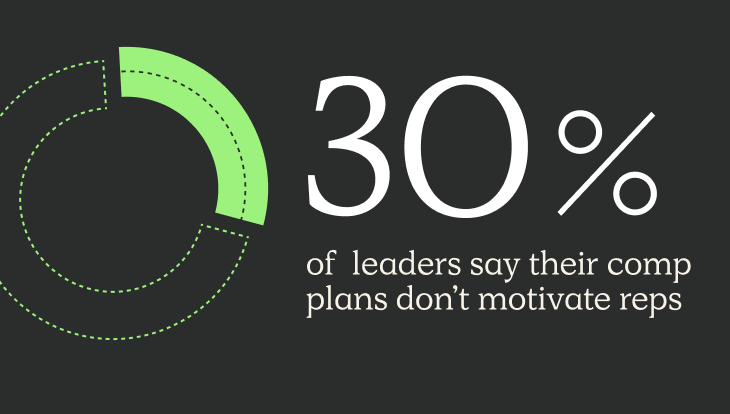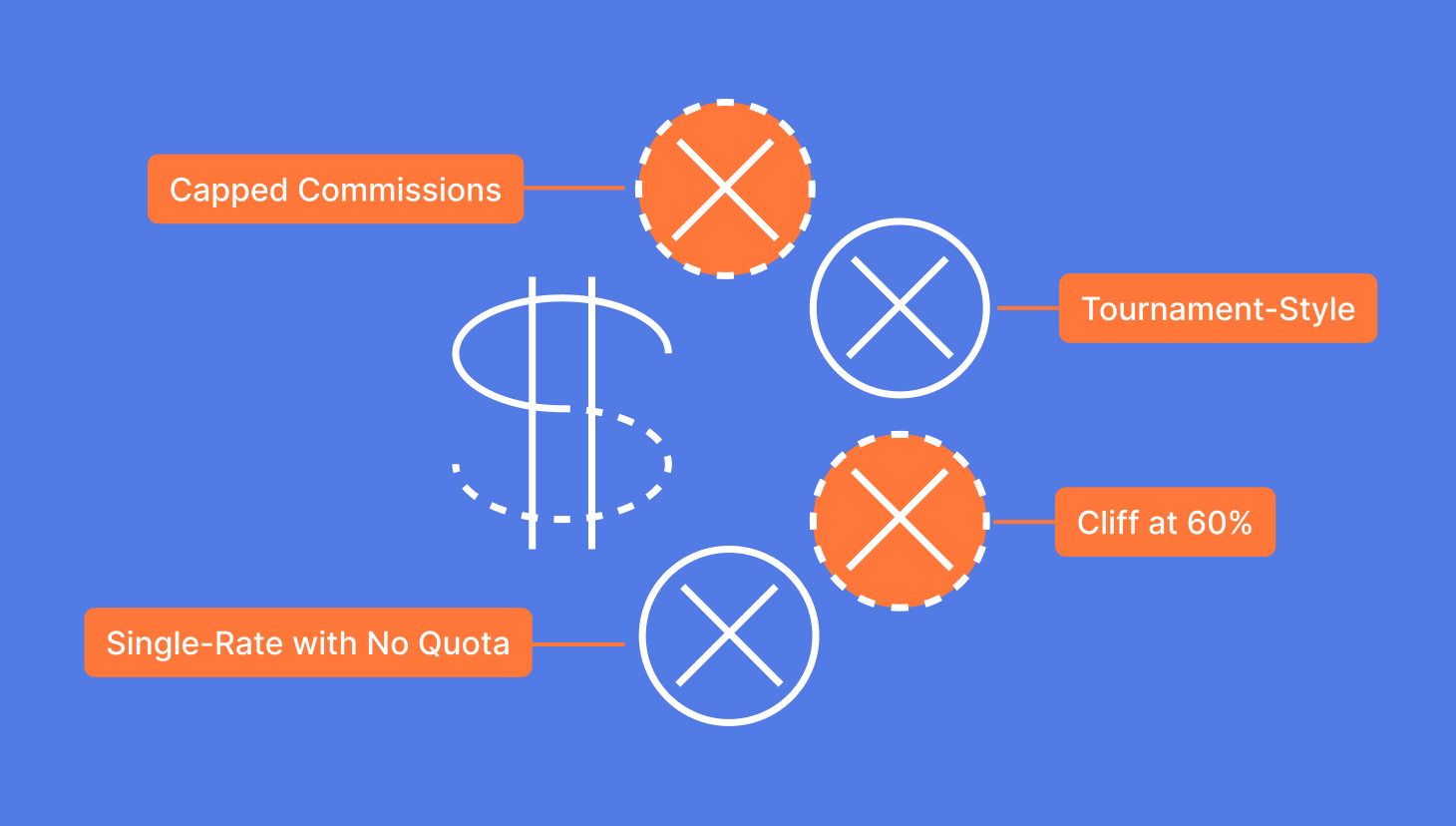SaaS company leaders face many challenges in compensation planning; however, aligning compensation with company goals is their biggest challenge. This alignment is crucial for driving business goals achievement.
But another challenge that pops up and is relative to alignment issues is the communication of comp plan changes. After all, 77% of revenue leaders said their reps found their comp plans challenging to understand, and 60% of reps take 3 to 6 months to completely understand how they earn variable pay from their compensation plans.
Compensation plans are ineffective if they don’t motivate reps. Another contributing factor is the failure to gather and integrate feedback into plans. Even if reps understand how they earn commission, if they feel that the plan is unrealistic or the incentives aren’t attractive to them, plans won’t inspire the level of performance you’re seeking. The best way to solve this is by routinely asking reps for feedback and then carefully considering their input as you create or update the plan.
Alignment, communication, and feedback integration all lead to motivation and trust in sales compensation for driving sales performance. When reps don’t trust their compensation plan and aren’t motivated by their incentives, you’re likely to fall short of business goal attainment.
Current State of Sales Compensation: Trust and Motivation
Revenue leaders need to change the way they build sales compensation plans. Our survey revealed that 44% of sales reps aren’t motivated by their comp plans and 75% of reps don’t trust they are paid fairly. These issues stem from a lack of effort from revenue leaders to gather feedback and effectively communicate compensation plans.
By gathering feedback from each person on the sales team, you learn where to prioritize your attention during compensation planning and what motivates each individual. These insights can help tailor compensation plans to motivate sales reps better and align with company goals. When reps are included and feel heard, trust is built, and they are more likely to be motivated by their comp plans.
Developing a Compensation Strategy with Feedback Integration
Feedback from reps includes insights about how they feel about their compensation plan if they feel incentivized, and how well they understand how they are paid. Plus, asking these questions of salespeople who aren’t driving the outcomes you aimed to achieve with your comp plan helps you determine how to adjust the plan to boost its effectiveness.
The key components of a compensation package include base salary, bonuses, and commissions. These are determined based on a combination of rep feedback and market research. Market research helps ensure you remain competitive in the marketplace, so you attract and retain top talent. Rep feedback helps you adjust plan elements, so they motivate reps to drive the outcomes tied to business objectives.
For instance, if the company wants reps to close more multi-year deals, the plan needs to reward reps for closing 2–3-year deals. However, if reps aren’t selling these deals, it may mean that the multi-year rate isn’t high enough compared to your base rate. Then, increasing the incentives for multi-year deals in the new plan is more likely to motivate reps to achieve this outcome.
Effective Communication Throughout the Compensation Planning Process to Build Trust
Communication is crucial to the success of new or altered sales compensation plans. Starting early builds trust and allows sufficient time for reps to understand their new plan. This understanding helps you gain rep buy-in and motivates reps to adopt desired behaviors to drive business goal achievement. Failure to effectively communicate compensation plans can result in rep frustration, loss of trust, demotivation, and rep turnover.
Steps for communicating the compensation plan rollout to employees include:
- Management education: Before implementing the new compensation plan, present it to all management levels. Detail each component, the reasons for the changes, and their impact on the salesforce, specifying who will be affected and how. Emphasize the advantages of the new plan and provide tips on maximizing commissions. Distribute plan documents, FAQs, instructional videos, what-if calculators, promotional video templates, and other launch materials.
- General plan and roll-out review by sales leadership: Senior sales management, such as a VP, should deliver a general plan and roll-out process review with the team. The goal is to energize and engage the entire sales organization as they launch the new compensation plan. After the session, send an email to the entire sales team summarizing the discussion and including a video highlighting the plan and outlining the roll-out process.
- More detailed small group plan review: Next, sales managers should provide their teams with a thorough review of the plan. Clarify how the plan affects both the team as a whole and individual contributors. Share detailed plan documents, FAQs, videos, what-if calculators, and other launch materials with the sales team members for their review.
- Individual plan review: After the group review, sales managers should meet individually with each team member to discuss how the new plan affects them personally. This allows reps to ask questions or express concerns about the new sales compensation plan in a private setting. Additionally, reps can submit any further questions via email, private chat, or phone as needed.
- Plan verification: Finally, have reps confirm they understand their plans by signing off on them. This is a crucial step in ensuring alignment and transparency throughout the compensation planning process. Plan verification or re-verification should be completed whenever changes are made to compensation plans. This can be done using DocuSign, via email, in person, or through our in-app Plan Verification feature.
Explaining the “why” and the “math” behind compensation decisions helps build trust.
Strategies for sharing the reasoning behind comp plan changes include having senior leadership present at the start of the sales kickoff meeting where they share the organization’s goals and relate them to performance and compensation. Discussing how the sales team’s work supports business objectives and drives goal achievement boosts rep buy-in, understanding, and focus.
Once reps know the why, it’s essential that they understand how their compensation is calculated. A couple of ways to accomplish this include calculating examples based on various scenarios in plan documents or giving the sales team access to forecasting software that automates commission calculations. This answers questions and clarifies how the new plan affects team members’ income potential.

How to Motivate Sales Team
70% of leaders say their plans motivate reps. Is that good enough?
Read MoreBest Practices for Feedback and Communication in Compensation Planning
Leverage these tips to incorporate feedback and communication throughout your compensation planning process to increase the effectiveness of your plans.
| Best Practice | Description |
| Solicit Feedback Early and Often | Collect input from sales reps and stakeholders early in the process. Conduct regular feedback sessions or surveys to understand concerns and preferences. |
| Use Anonymous Feedback Mechanisms | Allow team members to provide feedback anonymously to ensure honest and open communication. |
| Create a Feedback Loop | Establish a process for continuous feedback throughout planning and implementation. Communicate how feedback will shape compensation plans. |
| Be Transparent About the Compensation Process | Clearly explain the steps involved in developing and implementing compensation plans. Share the criteria and data used in decision-making. |
| Communicate Regularly and Proactively | Provide frequent updates on the status of compensation planning and changes. Use multiple channels to ensure all team members are informed. |
| Explain the “Why” Behind Decisions | Detail the rationale and data behind compensation decisions to build trust. Clarify how the plan aligns with company goals and performance. |
| Involve Leadership in Communication Efforts | Ensure senior leaders are involved in communicating the plan and changes, adding credibility and reinforcing importance. |
| Provide Clear, Understandable Compensation Documents | Develop easy-to-understand guides that outline the plan’s details, including examples and scenarios for clarity. |
| Prepare for Q&A Sessions | Host sessions to address concerns or questions about the plan. Be prepared to discuss fairness, calculations, and changes. |
| Establish Open Door Policies | Encourage an open-door policy where employees can discuss compensation concerns with management without fear of reprisal. |
| Highlight Success Stories and Positive Outcomes | Share examples of how the new plan has positively impacted team members or the organization to boost morale. |
| Align Communication with Company Values | Ensure all communication reflects the company’s values and culture, reinforcing that compensation recognizes contributions. |
| Monitor Feedback and Adjust Accordingly | Continuously monitor feedback post-rollout to identify dissatisfaction or confusion. Be willing to adjust and communicate changes promptly. |
| Encourage Two-Way Communication | Promote a culture where employees feel comfortable providing ongoing feedback. Encourage managers to listen and respond to concerns actively. |
Design, track, and manage variable incentives with QuotaPath. Give your RevOps, finance, and sales teams transparency into sales compensation.
Talk to SalesIntegrate Feedback and Communication in Comp Planning
Feedback and communication are essential elements in the compensation planning process. Incorporating these practices enables you to make more informed strategic decisions as you create plans for the new year. Doing so increases the effectiveness of the comp plans, motivates desired rep behaviors, and drives organizational goal achievements.
Learn more about how QuotaPath can assist in the compensation planning process to ensure alignment between compensation and motivation, driving desired business outcomes. Schedule time with the QuotaPath team for a consultation.



